The Czech Head Awards - the highest national scientific awards - highlight the most talented scientists and the results of their research and innovative ideas. This year, a number of CU scientists received top recognition: Jan Dobeš from the Faculty of Science of Charles University and Petr Pávek from the Faculty of Pharmacy at CU. The winners of this year's awards were announced by Česká hlava organisers together with the Office of the Government of the Czech Republic on Friday 22 November at Kampus Hybernská, and the gala evening on the occasion of the award ceremony will be held on Sunday evening at the Faculty of Humanities of the Charles University and will be broadcast live on public broadcaster Czech TV.
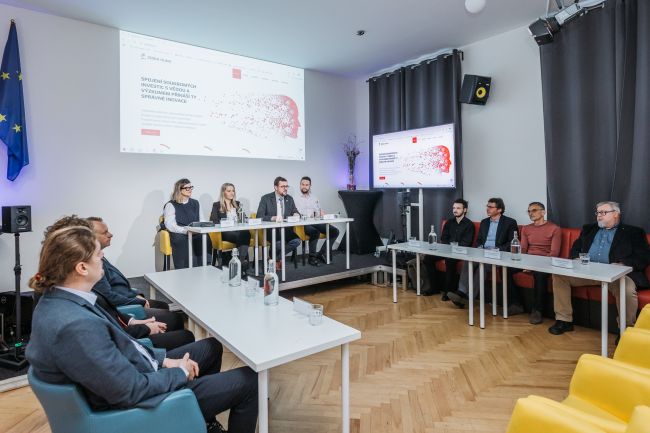
The Czech Head Awards have been presented in several different categories since 2002. Their aim is to recognise the greatest scientific talents and innovative ideas and to help gain scientists the attention and respect they deserve not unlike success enjoyed by athletes or artists. Professor Antonín Holý and the writer Arnošt Lustig were at the origin of this prize. The awarding of the National Government Award Czech Head is decided by the Government of the Czech Republic on the recommendation of the Council for Research, Development and Innovation as its advisory body. The awarding of other prizes is decided by an expert jury headed by Professor Richard Hindls.
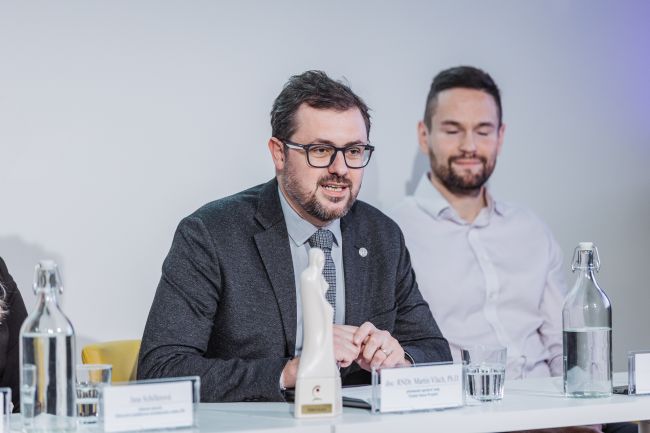
ABB Prize, INVENCE Prize
This year, the ABB Prize, the INVENCE Prize, was awarded to immunologist Jan Dobeš from the Faculty of Science of Charles University. The jury appreciated the fact that Jan Dobeš, who heads the Laboratory of Microbial Immunology (Dobeš Lab) at the Faculty of Science of the Charles University, together with his team, shed light on how the immune system fights yeast infections. As Jan Dobeš himself says, their research has helped to unravel one of the mysteries of immunology.
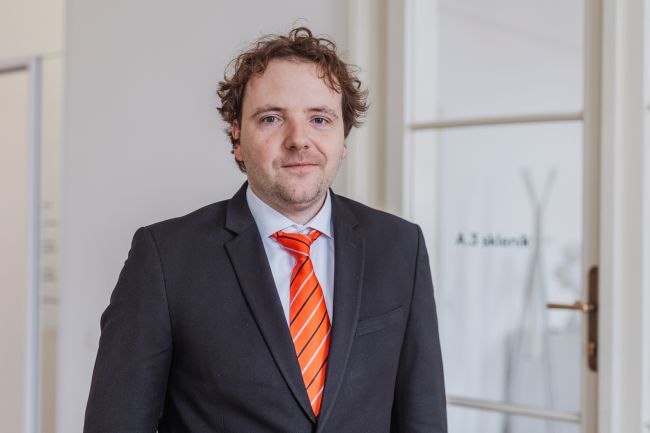
“In Finland, Norway or even in a small village in Sardinia, Italy, patients with a mutation of the Aire gene, which is crucial for the proper functioning of the immune system, are more frequently found. These patients suffer from autoimmune diseases as well as repeated yeast infections. Why is the immune system, on the one hand, overly attacking its own body and causing diabetes and other autoimmune diseases, and on the other hand, not being able to defend itself against yeast that it would normally eradicate?” this was a question that immunologists had been puzzling over for years, as Jan Dobeš pointed out.
But it was only his team that managed to unravel this mystery. His research into rare diseases led him to discover the basic principles of the immune system. “Aire stands for autoimmune regulator - a protein that plays a crucial role in training the white blood cells in the thymus to distinguish between cells of their own body and harmful foreign invaders to which the immune system is supposed to respond. If the white blood cells make the mistake of reacting to their own cells, they are mercilessly destroyed. When the Aire gene is mutated, mistakes are made in training the white blood cells, and they attack their own body cells, leading to autoimmune diseases. We've seen this before. But it has long remained a mystery why patients with the same mutation also suffer from frequent yeast infections that their immune systems cannot effectively fight. Only our discovery has solved this mystery. We discovered another group of cells in the lymph nodes that also produce Aire. These cells are key to activating white blood cells to fight yeast infections. However, in patients with mutations in Aire, the white blood cells do not receive the necessary signals that a yeast infection is growing in the body and so cannot act against it,” Jan Dobeš explains.
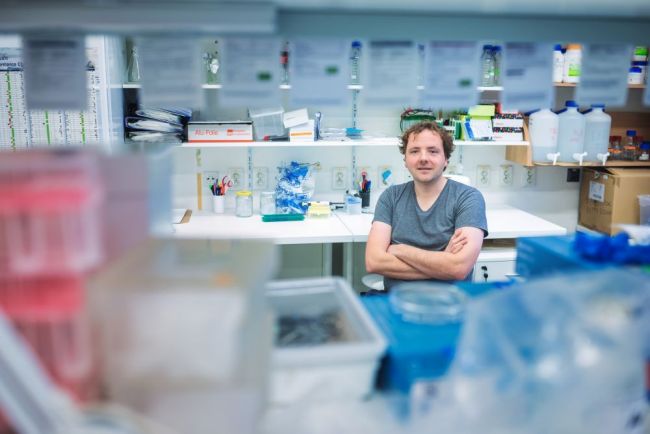
His path to this fundamental understanding of the functioning of the immune system was also helped by the fact that he worked as a postdoc in the laboratory of immunologist Jakub Abramson at the Weizmann Institute of Science in Israel (who later travelled to the Czech Republic for a scientific sabbatical, which he decided to spend partly at the Faculty of Science of Charles University precisely because of his collaboration with Jan Dobeš. Later, Jan Dobeš received a Primus grant, which Charles University awards to promising young scientists to develop their research and build their own research team. This is how his "Dobeš Lab" was created. Last year, the talented scientist also managed to obtain an ERC CZ grant, which is awarded by the Ministry of Education to scientists who received a high rating from the European Research Council for their submitted project, but did not receive a grant directly due to lack of funds in the budget.
Health Insurance Company of the Ministry of the Interior of the Czech Republic, LOREM Award
Professor Petr Pávek from the Faculty of Pharmacy of the Charles University in Hradec Králové has been awarded the Health Insurance Company of the Ministry of the Interior of the Czech Republic, LOREM Prize. The jury awarded Petr Pávek for his long-term research aimed at discovering new drugs and testing their effects in experiments on various biological models. Thanks to modern technologies such as genetically engineered mice and cell cultures, his team has the ability to more accurately simulate human diseases. These models make it possible to test how new drugs might work in humans.
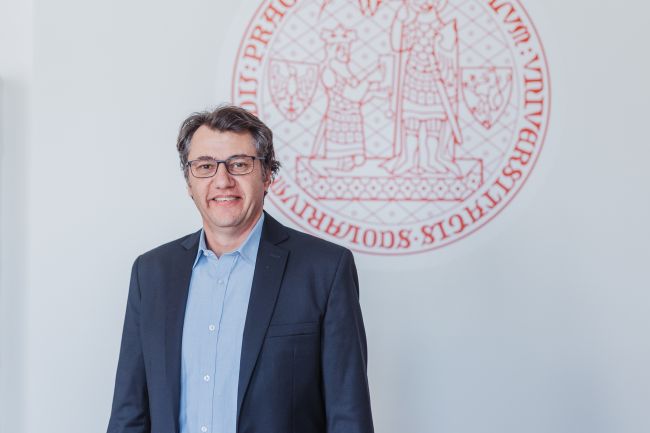
“The main goal of our research is to find molecules that can bind to specific proteins in cells, so-called receptors, and thus influence important processes in the body. The research focuses in particular on metabolic diseases - for example, problems with fat storage in the liver or high cholesterol levels. The uniqueness of these new drugs is their ability to affect multiple receptors simultaneously, which can amplify the effect," explained Professor Petr Pavek. His team has discovered several new molecules with a 'dual effect' of sorts, which could mean a completely new approach to treatment.
Professor Pávek's second major area of research is drug detoxification - the process by which the body converts drugs into harmless substances which it then eliminates. This research can help develop drugs that are not only more effective but also safer for the body. Professor Pavek's research holds out hope for new, more effective and safer treatments for lifestyle-related diseases and rising obesity.

Since this year, Petr Pávek has been the guarantor of the nearly half-billion-dollar project New Technologies for Translational Research in Pharmaceutical Sciences (NetPharm), which started at the Faculty of Pharmacy of the Charles University in March. NetPharm is funded by the Jan Amos Komenský Operational Programme (OP JAK), the Top-class research call.
He also led the international project Metabolic effects of Endocrine Disrupting Chemicals: novel testing methods and adverse outcome pathways (EDCMET) funded by the European Union's Horizon 2020 Framework Programme from 2019 to 2023. His team was also involved in the multidisciplinary project The European Network of Understanding Gastrointestinal Absorption-related Processes (UNGAP) also funded by Horizon 2020.
National Government Czech Head Award
This year, the National Government Czech Head AWARD will go to physicist
Tomáš Jungwirth from the Institute of Physics of the Czech Academy of Sciences, who is a graduate of the Faculty of Mathematics and Physics of Charles University and has worked closely with the Faculty for a long time. Tomáš Jungwirth is a world-renowned scientist working on spintronics research. This field of micro and optoelectronics has enabled the development of modern hard disk drive technology for data storage in cloud centres. Today, spintronic memories are becoming a key component in processor chips.
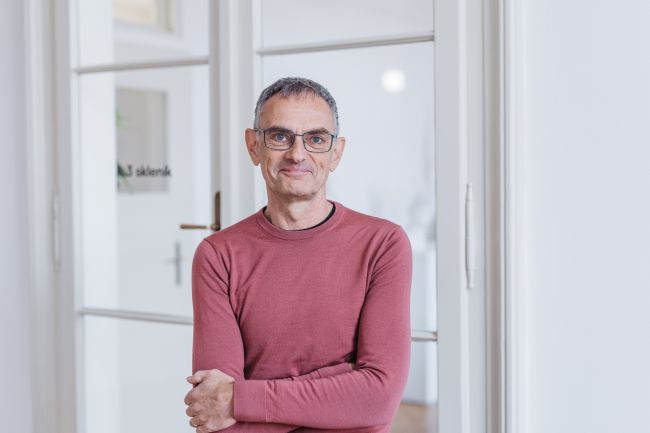
The best PhD student is from CU
Another of the honourees in the Czech Head project is also tied to the Faculty of Mathematics and Physics at Charles University. The VEOLIA prize, the Doctorandus Award for Natural Sciences, was awarded to Jakub Podgorný, a recent graduate of PhD studies at the Faculty of Mathematics and Physcis, who is currently working at the Astronomical Institute of the CAS.
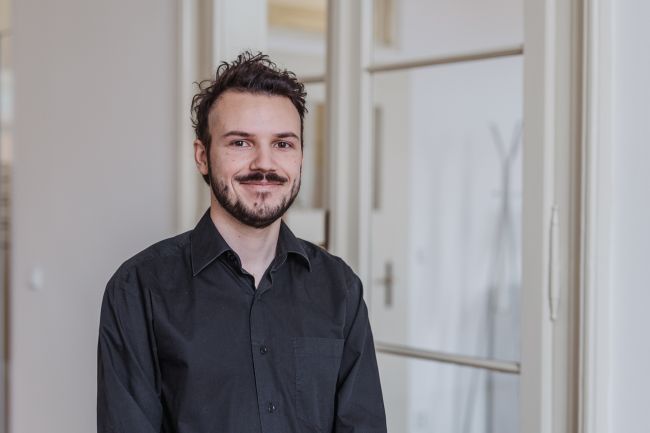
His dissertation, Polarization of X-rays from accreting supermassive black holes, is devoted to elucidating the origin of polarisation, i.e. the predominant plane of oscillation, of X-ray light in the vicinity of supermassive black holes inside active galactic nuclei. However, the partial results are of a more universal nature and can also be applied to stellar-mass black holes inside X-ray binaries. For his PhD research project, he was also awarded the CU Grant Agency Prize on 17 November by CU Rector Milena Králíčková.
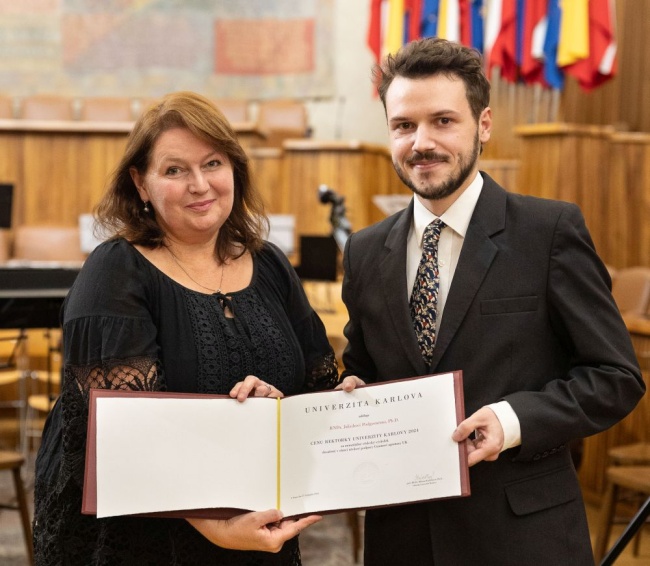
TEXT: Helena Zdráhalová
PHOTOS: Petr Jan Juračka, Veronika Vachule Nehasilová, Michal Novotný